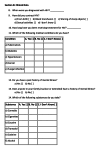Depression and Its Predictors in Adults Receiving Antiretroviral Therapy
- PMID: 40370921
- PMCID: PMC12076177
- DOI: 10.7759/cureus.82222
Depression and Its Predictors in Adults Receiving Antiretroviral Therapy
Abstract
Background and aim Depression is a common psychiatric morbidity seen in adults living with HIV/AIDS. Several contextual factors have been implicated in the pathogenesis of depression in HIV-positive adults, these factors could be clinical, treatment-related, or socio-demographic in nature. Due to the debilitating nature of depression and its adverse effect on antiretroviral treatment adherence, HIV-positive adults living with depression are at risk of sub-optimal treatment response and, consequently, poor health outcomes. This suggests that there is a need for more research on depression and its risk factors in HIV-positive adults, as this could inform the promotion of preventive measures against the disorder, as well as early identification and treatment of affected persons. This study aimed to determine the prevalence and predictors of depression among HIV-positive adults receiving antiretroviral therapy. Methods This was a cross-sectional study of 257 HIV-positive adults conducted at the Hematology Clinic of the Lagos State University Teaching Hospital, Ikeja, Nigeria. Respondents were selected using a systematic random sampling method. Study instruments used were as follows: the Patient Health Questionnaire (PHQ-9), the four-item Morisky Medication Adherence Scale (MMAS-4), the Multidimensional Perceived Social Support Scale (MPSSS), and a socio-demographic/clinical data questionnaire. Data were analyzed using the EPI-Info statistical analysis software version 7.0 (Atlanta, GA: Centers for Disease Control and Prevention). Univariate, bivariate, and multivariate analyses were done to determine the prevalence and predictors of depression among HIV-positive adults. Results The prevalence of depression was 54%, and predictors of depression were being unmarried (n=91, OR=10.9, 95% CI=4.6-26.2, p=0.000), female gender (n=119, OR=5.8, 95% CI=2.2-15.5, p=0.000), low social support (n=57, OR=11.2, 95% CI=4.1-30.8, p=0.000), and unemployment (n=27, OR=0.2, 95% CI=0.1-0.7, p=0.007). Conclusion Depression is frequently reported among HIV-positive adults, and its occurrence may be influenced by clinical, social, and demographic-related factors. These variables need to be considered in patient care at antiretroviral clinics in order to achieve a good treatment prognosis. Furthermore, future research may focus on intervention studies on depression in HIV-positive adults, especially in those with increased vulnerability to depression.
Keywords: anti-retroviral therapy; depression; hiv/aids; mental health; predictors.
Copyright © 2025, Lebimoyo et al.
Conflict of interest statement
Human subjects: Consent for treatment and open access publication was obtained or waived by all participants in this study. Lagos State University Teaching Hospital Health Research and Ethics Committee issued approval #LREC/06/10/2453. Animal subjects: All authors have confirmed that this study did not involve animal subjects or tissue. Conflicts of interest: In compliance with the ICMJE uniform disclosure form, all authors declare the following: Payment/services info: All authors have declared that no financial support was received from any organization for the submitted work. Financial relationships: All authors have declared that they have no financial relationships at present or within the previous three years with any organizations that might have an interest in the submitted work. Other relationships: All authors have declared that there are no other relationships or activities that could appear to have influenced the submitted work.
Figures
Similar articles
-
Prevalence of Depression and Suicidal Ideation and Associated Risk Factors in Adolescents Receiving Care and Treatment for Hiv/Aids at a Tertiary Health Facility in Kilimanjaro Region, Tanzania.Res Sq [Preprint]. 2023 Feb 28:rs.3.rs-2534893. doi: 10.21203/rs.3.rs-2534893/v1. Res Sq. 2023. PMID: 36909487 Free PMC article. Preprint.
-
Association of first-line combination antiretroviral therapy with malaria among adult HIV-infected persons in Jos, Nigeria: a pilot cross sectional study.BMC Infect Dis. 2024 Sep 27;24(1):1038. doi: 10.1186/s12879-024-09923-8. BMC Infect Dis. 2024. PMID: 39333924 Free PMC article.
-
Socio-demographic and food insecurity associated with adherence to antiretroviral therapy among HIV adults in Ahmadu Bello University teaching hospital Zaria, Kaduna State Nigeria.Afr Health Sci. 2023 Dec;23(4):236-246. doi: 10.4314/ahs.v23i4.26. Afr Health Sci. 2023. PMID: 38974269 Free PMC article.
-
Tuberculosis.In: Holmes KK, Bertozzi S, Bloom BR, Jha P, editors. Major Infectious Diseases. 3rd edition. Washington (DC): The International Bank for Reconstruction and Development / The World Bank; 2017 Nov 3. Chapter 11. In: Holmes KK, Bertozzi S, Bloom BR, Jha P, editors. Major Infectious Diseases. 3rd edition. Washington (DC): The International Bank for Reconstruction and Development / The World Bank; 2017 Nov 3. Chapter 11. PMID: 30212088 Free Books & Documents. Review.
-
A Systematic Review and Meta-Analysis on Depression and Associated Factors among Adult HIV/AIDS-Positive Patients Attending ART Clinics of Ethiopia: 2021.Depress Res Treat. 2021 Oct 20;2021:8545934. doi: 10.1155/2021/8545934. eCollection 2021. Depress Res Treat. 2021. PMID: 34721902 Free PMC article. Review.
References
-
- Fact Sheet 2024: Global HIV Statistics. UNAIDS. 2024. https://www.unaids.org/sites/default/files/media_asset/UNAIDS_FactSheet_... https://www.unaids.org/sites/default/files/media_asset/UNAIDS_FactSheet_...
-
- Epidemiological Fact Sheet: HIV statistics, globally and by WHO region, 2023. 2023. https://iris.who.int/bitstream/handle/10665/376793/WHO-UCN-HHS-SIA-2023.... https://iris.who.int/bitstream/handle/10665/376793/WHO-UCN-HHS-SIA-2023....
-
- Life expectancy of HIV-1-positive individuals approaches normal conditional on response to antiretroviral therapy: UK collaborative HIV cohort study. May M, Gompels M, Sabin C. J Int AIDS Soc. 2012;15
-
- HIV infection and its psychiatric manifestations: a clinical overview. Knights MJ, Chatziagorakis A, Buggineni SK. BJPsych Adv. 2017;23:265–277.
LinkOut - more resources
Full Text Sources


